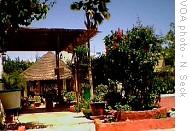voa标准英语2008-Holistic Healing Center Takes African Healing Up
搜索关注在线英语听力室公众号:tingroom,领取免费英语资料大礼包。
(单词翻译)
As African communities develop and modernize1, proponents2 of traditional medicine are evolving new faces of the practice to keep up. Naomi Seck reports from a holistic3 healing center in Senegal's capital, Dakar, where traditional healing practices are infused into luxurious4 treatments like pedicures and massage5. |
| Flowers bloom in the luxurious Imaalah Center in Dakar |
Wind chimes twinkle as a breeze passes through the sculpted6 garden of the Imaalah center. An employee wearing a tie-dyed uniform sits under an open-sided tent, with creams and candles on shelves all around, ready to massage the feet and paint the toenails of her clients.
The founder7 of the center, Evelina Mertel, points to a lawn in the far corner. She says, when they need people to have contact with nature, she asks them to sit there to take contact with the earth.
Among other services, Mertels's center houses a small shop, where she sells a variety of ointments8 and creams.
She says the recipes were passed down to her from her grandmother.
These ointments have a variety of purposes, including ones that purport9 to ease medical conditions, such as hemorrhoids.
Products with similar ingredients - aiming to cure similar problems - can be found in many places in Dakar.
Across town, there is a thriving traditional medicine practice, run by Kaoussou Sambou, a botanist10 and retired11 university professor.
Sambou's assistants bustle12 busily in the dingy13, windowless office. They pour powders directly into plastic bags and package other treatments, made of sticks and roots, into newspaper.
Mertel, a Cape14 Verdian who trained in France in aromatherapy and and a wide array of Asian massage techniques, says the luxurious surroundings at her center are an important facet15 of what she offers.
She says her operation is a center for well being. And well-being16, she says, is in the eyes, what we see, in what we smell, what we feel.
These extra touches - like fancy packaging and all organically grown ingredients - come with a price tag.
Her products range from about $6 to $14. At Sambou's center, a couple of week's worth of treatment for hemorrhoids costs only $4.
Mertel says she wants to see African holistic healing take a prominent place on the world stage, alongside more well-known Asian techniques like Shiatsu and Reiki. She says African methods have a lot to offer, but are not as widespread because African practitioners17 do not often talk about what they do.
That meant that, even though she grew up knowing about African massage traditions, it was not easy to find someone to teach her the techniques.
She says, when she first asked how to do African massage, she would get no response.
Eventually, she stopped asking direct questions, but learned through observation and by asking about the philosophy that led to the practice.
For instance, she learned that the tradition of massaging18 infants stems from a belief in the meaning of birth as a separation, in three senses, from the waters of the womb, from the mother, and from the infant's double, the placenta.
She says the massage is intended to heal the baby after the three separations and help him or her accept his new existence.
She hopes to use her center to introduce more people to these African techniques. She is running classes at the center to teach massage therapists.
The African techniques, mixed with the Asian ones Mertel learned in her formal training, are put to use on eight-year-old Mamy.
Mamy's muscular development was damaged when she suffered from meningitis as a baby. Now she is one of several disabled children being treated for free at the Imaalah Center, in the hopes that massage and physical therapy in the center's pool will help her muscles regain19 strength.
And, as she sings contentedly20 during her massage, it is clear that Mertel's investment in creating a comfortable space has paid off - for Mamy, at least.
When her massage is over, she refuses to go home.
 收听单词发音
收听单词发音 




